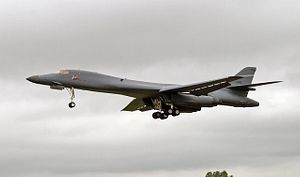Days after U.S. Secretary of State Rex Tillerson left Beijing after his inaugural state visit to China, Chinese air traffic controllers warned a U.S. bomber flying over the East China Sea. According to U.S. Department of Defense sources who spoke to Fox News, the “Chinese military issued a warning to a U.S. Air Force B-1 bomber flying in the East China Sea.” The U.S. bomber was reportedly flying 70 nautical miles southwest of South Korea’s Jeju-do, according to CNN.
The warning is the latest publicized incident of Chinese authorities attempting to enforce the controversial air defense identification zone (ADIZ) that China declared over a large swathe of the East China Sea in November 2013. The United States said at the time that it would not acknowledge Chinese notification requirements for flight through the ADIZ and continues to treat most of the airspace of the East China Sea — excluding Japanese territorial airspace and Chinese coastal territorial airspace — as international airspace.
According U.S. Pacific Air Forces spokesman Maj. Phil Ventura in a statement to CNN, the pilots of the U.S. B-1B Lancer “responded to the Chinese air traffic controllers, saying that they were conducting routine operations in international airspace and did not deviate from their flight path.” “Pacific Air Forces … did not recognize the Chinese Air Defense Identification Zone (ADIZ) when it was announced in November of 2013, and does not recognize it today,” Ventura additionally noted.
In a press conference on Thursday, Chinese Foreign Ministry spokesperson Hua Chunying addressed the concerns by referring reporters to the Chinese Ministry of Defense, which has yet to comment publicly on the incident. Hua added that “It is the legitimate right of a sovereign state to demarcate ADIZs. The US, who also has its ADIZs, should respect the right of other countries to establish ADIZs,” echoing China’s position on the issue since its unilateral declaration in 2013.
The incident coincides with reports last week that the Trump administration was waiting to authorize new freedom of navigation operations (FONOPs) in the South China Sea. The U.S. Navy and Pacific Command have requested permission to conduct FONOPs within 12 nautical miles of disputed features in the South China Sea, but have not received the Trump administration’s imprimatur. Though there’s no clear answer as to why the administration hasn’t approved new operations, one possibility is that it is looking to avoid taking action to imbue U.S.-China ties with any tension before a summit between Chinese President Xi Jinping and Donald Trump expected in the first week of April.

































